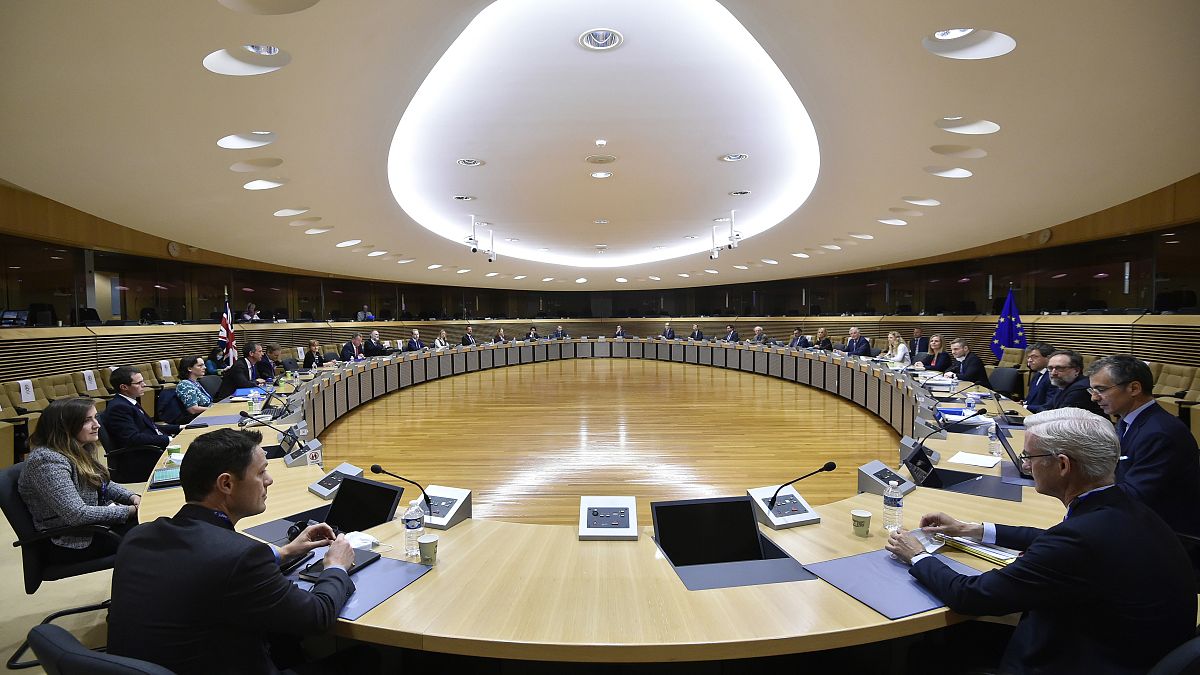Talks on a future EU-UK trade deal have resumed in Brussels, with negotiators meeting face-to-face for the first time since the COVID-19 outbreak.
Talks on a future EU-UK trade deal have resumed in Brussels, with negotiators meeting face-to-face for the first time since the COVID-19 outbreak forced the process to be carried out via video link.
Both sides have indicated a new drive to make headway with intensified talks over the coming weeks, following the virtual meeting earlier in June between UK Prime Minister Boris Johnson and European Commission President Ursula von der Leyen.
That encounter saw the EU accept the British government's refusal to countenance an extension to the transition period, which keeps pre-Brexit arrangements largely as they were until it expires at the end of the year.
But the deadline for reaching agreement on a wide range of issues is earlier in practice to allow time for ratification, and Downing Street has said talks must not drag on into the autumn.
However, London and Brussels remain far apart on key issues such as fishing policy and the commitment to a "level playing field" in competition, as set out in the divorce deal.
Despite some more positive noises suggesting compromise, there is little sign so far of a break in the stalemate throughout several rounds of talks on the future relationship since the UK left the EU in January.
"Some of the EU's unrealistic positions will have to change if we are to move forward," the UK's chief negotiator David Frost said in a tweet posted last week. "UK sovereignty, over our laws, our courts, or our fishing waters, is of course not up for discussion. Equally we do not seek anything which would undermine the integrity of the EU's single market."
"Our overall message this week but also for the coming weeks and the coming months is to intensify our negotiations in order to make progress in order to get a deal," said European Commission spokesperson Daniel Ferrie on Monday.
Row over state aid
Of key concern to the European Union are rules on state aid, where the bloc wants to ensure it is not undercut by future UK policy—along with other areas such as the environment, labour law, data protection and tax.
The EU's chief negotiator Michel Barnier has accused the UK government of failing to set out its plans, and of deviating from its obligations by being determined to forge its own path.
The EU wants the UK to follow "dynamic alignment" (following EU standards as they change overtime) on subsidy policy, giving the European Court of Justice (ECJ) oversight of some UK economic policy.
Simon Usherwood, Professor of Politics at Surrey University, says the EU has shown signs of flexibility over fisheries, but the UK is likely to have to move towards the EU's position generally.
"It hasn't been able to develop a detailed plan, and I think that's been a consistent problem for the British government: that they're very clear about what they don't like, they're less clear about what they do like," he told Euronews.
"As long as they're in that situation, they don't really have a comeback to the much more detailed propositions that the EU has been advancing," he added.
Watch the interview with Simon Usherwood in the video player above.
Further pressure has been put on the negotiating timetable with the announcement that David Frost is to become the UK's national security adviser from September, although he will continue to lead talks from the British side.
Failure to reach agreement would mean that from January the EU and the UK would trade on World Trade Organization (WTO) terms, which many businesses and economists say would be disastrous. It would also leave arrangements on a wide variety of issues in a state of legal limbo.
Strengthening ties with Australia
As the UK moves away from the EU, it's looking for other trading partners around the world. That includes other commonwealth countries, like Australia, with whom talks began in London on Monday.
"This is all about getting some runs on the board, if you like, getting some early trade deals in. This looks like it should be relatively straightforward and we can say this is an early Brexit dividend," David Henig, a former official at the UK Department for International Trade, told Euronews.
The UK is Australia's seventh-largest trading partner, but Henig said a new deal between London and Canberra, hoped to be reached by the end of the year, is more about optics than economics.
"We're talking about boosts of at most 0.05% of GDP, a few hundred million. It's not going to make a huge difference to either economy, but every little bit helps," he said.
"This in no way makes up for if there was reduced trade with the EU – this is a completely different ballgame really, much smaller but hopefully much easier as well."
